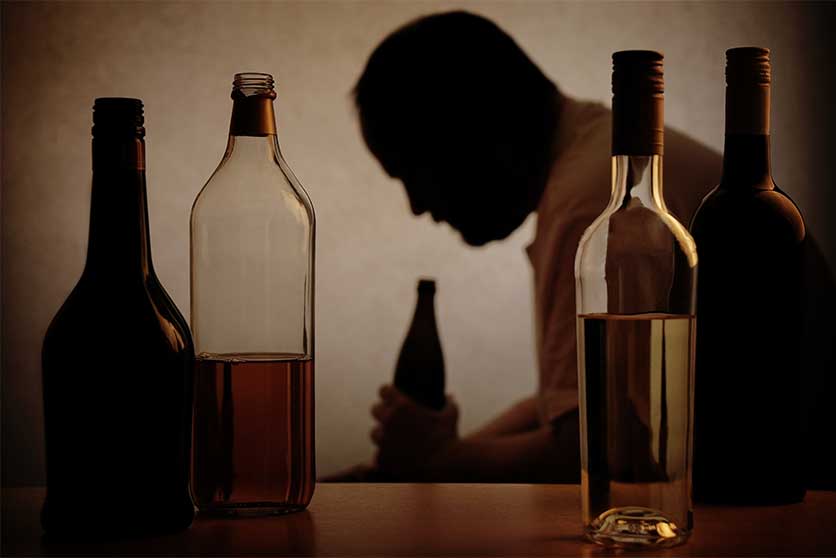Warning Signs & Symptoms Of Alcohol Use Disorder

Medically Reviewed By: Manish Mishra, MBBS
When a medical professional discusses the possibility that you have an alcohol problem, certain warning signs and symptoms may be used to help shape and define the conversation, along with an overall discussion of your drinking habits, the amount of alcohol consumed, and short-term or long-term effects.

Binge drinking, heavy drinking, and chronic alcohol abuse can have severe consequences ranging from drunk driving to alcohol poisoning, blackouts, liver disease/cirrhosis, cancer, and more.
However, understanding when a person’s use of alcohol has become unmanageable, harmful, or risky can be difficult.
As a result, health professionals have developed standards, warning signs, and symptoms to define what constitutes an alcohol use disorder (alcohol addiction or alcoholism) and to help encourage those who struggle with alcohol dependence to get help.
Warning Signs & Symptoms Of Alcohol Use Disorder (AUD)
An alcohol use disorder (AUD) is a pattern of alcohol use in which a person has trouble controlling or moderating their drinking, even when it causes problems.
This medical condition is defined in the American Psychiatric Association’s Diagnostic and Statistical Manual of Mental Disorders (DSM5) by the presence of at least two of the 11 criteria occurring in a 12-month period.
These criteria and warning signs include:
You Drink More Than You Mean To
You often drink more alcohol or drink for a longer period of time than you meant to. Your drinking tends to get away from you once you get started, even if you try to set limits ahead of time.
You Have Trouble Not Drinking
You sometimes (or all the time) feel like you want to stop drinking or drink less, but you haven’t been able to follow through and limit your alcohol use so far. In other words, you want to stop drinking but find you can’t.
Alcohol Is a Part Of Your Daily Routine
You are now spending a lot of time getting alcohol, drinking alcohol, or recovering from hangovers or other issues after recent alcohol misuse. Drinking has been taking over more and more of your life.
You Feel Alcohol Cravings
You are often preoccupied with thoughts of drinking or making plans to drink, or you feel strong urges or cravings to have a drink if it’s been a while since your last drink. You may feel like you need alcohol to function.
Drinking Has Impacted Your Work
Your alcohol use has been getting in the way of your responsibilities at work, in school, or around the home. Your alcohol use is becoming unmanageable.
Drinking Has Come Between You And Those You Love
Your drinking habits have led to problems in your relationships, including your social connections and family or romantic connections. Those around you may have expressed worry, or you may have become more and more distant or isolated.
You’re Sidelining Yourself To Drink
You’ve passed up on hobbies, work events, social gatherings, or other important things that you enjoy because of the effects of alcohol or your need to consume alcohol instead. You are disappointed when an event is alcohol-free.
You Drink Even When It Isn’t Safe (For You Or Others)
Your problem drinking has involved drinking and driving, drinking before or during work, consuming alcohol while taking care of children, becoming heavily impaired in unsafe settings, mixing alcohol and other drug abuse, or other high-risk alcohol abuse.
You Use Alcohol Even When You Know It Isn’t Good For You
You recognize that you have a physical health condition like high blood pressure or liver damage, or a psychological problem like anxiety or depression, and you understand that alcohol consumption is a bad idea. But you use alcohol anyway.
You Have Developed A High Alcohol Tolerance
You’ve noticed that lately it takes more drinks or stronger drinks to give you a buzz or get you drunk, so you’ve been drinking larger amounts of alcohol than before.
You Get The Shakes
If you stop drinking, you start to feel shaky, anxious, or irritated until you have a drink. In more serious cases, you may also experience other classic but dangerous alcohol withdrawal symptoms like seizures, hallucinations, fever, or high blood pressure.
Risk Factors For AUD
Along with warning signs, AUDs are associated with personal risk factors, including:
- drinking or engaging in other substance use from a young age
- having a family history of alcohol or other substance abuse
- experiencing mental health problems like anxiety, depression, schizophrenia, personality disorders, or PTSD
- experiencing difficult or traumatic events, especially childhood trauma
- spending time in settings or around others where alcohol abuse is common or celebrated
Treating AUD
As harmful and dangerous as an alcohol use disorder is, treatment is available that can help you or your loved one overcome alcohol’s effects and build a positive lifestyle.
Ohio Recovery Center offers comprehensive inpatient addiction treatment services for alcohol dependence and alcohol use disorder at our modern recovery center in Northwest Ohio. Our alcohol addiction treatment options include:
- medically assisted detox
- inpatient residential treatment services
- behavioral therapy
- support groups
- medication-assisted treatment options including acamprosate, disulfiram, and naltrexone
- dual diagnosis care for co-occurring mental health disorders
- aftercare support
To learn more about our personalized alcohol treatment services, please contact our team today.
- Substance Abuse and Mental Health Services Administration (SAMHSA) https://www.samhsa.gov/sites/default/files/alcohol_use_facts_and_resources_fact_sheet_2018_data.pdf
- National Institute on Alcohol Abuse and Alcoholism (NIAAA) https://www.niaaa.nih.gov/publications/brochures-and-fact-sheets/understanding-alcohol-use-disorder

